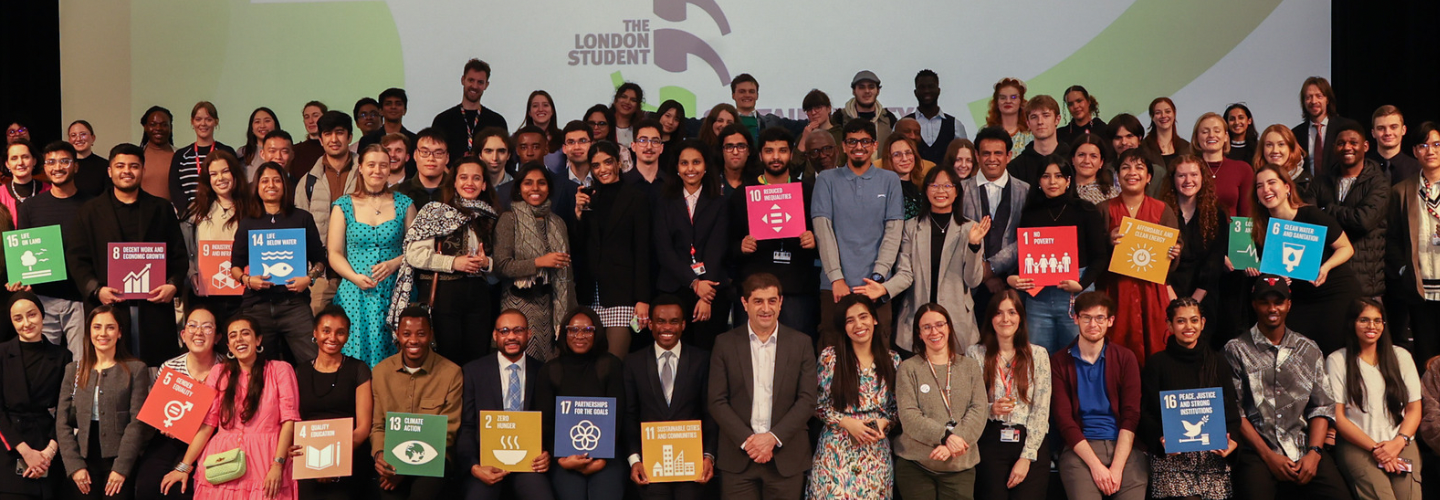City selects four students to take part in LSSC24 to discuss their sustainability research.
Published
City, University of London was the lead partner of the sixth London Student Sustainability Conference (LSSC24), held on Wednesday 21 February at Imperial College London.
Around 170 attendees took part in LSSC24, which saw students give presentations, host workshops, hold a poster exhibition, and attend a networking evening.
Originally founded by City, the conference is a collaboration between ten London-based universities. This year, City selected four students and alumni across multiple disciplines to present their research.
Dermot Barnes, Head of Sustainability at City, said:
PhD candidate Kim Smith highlights the importance of food education
PhD candidate Kim Smith is studying towards a PhD in Food Policy with a focus on food education in primary schools.
She took part in the conference to raise awareness of the role of food education in addressing sustainable development goals.
Her presentation – called “No-one is born a great cook, one learns by doing” – was based on her PhD literature review, which looks at different primary school food education approaches.

Kim was encouraged by her supervisors at City to apply for LSSC24 to get food education on the sustainability agenda. She says:
“Current education policy in England lacks a connection between food and climate change, which is odd given that the food system is one of the biggest contributors to climate change, biodiversity loss, and water use,” she adds. “We are not leveraging the potential of schools to equip children with the skills and knowledge they need to live a sustainable lifestyle, today and in the future."
Kim's dream is to raise the profile of food education in primary schools.
"I want to build a community of like-minded people to ensure all children are equipped with the skills and knowledge to live sustainably," she says.
Natalie Jakiemiec wants us to rethink how we redistribute food surplus
Alumna Natalie Jakiemiec (MSc Food Policy), who grew up in the Bay Area in America, presented a talk on how food surplus can be redistributed to avoid food waste.

She used the example of San Francisco as a case study example. Her findings offer strategies for cities to address food waste and hunger in the long term. To create a more sustainable world, Natalie believes sustainable farming will be a key avenue .
"I think farmers need better support in transitioning to sustainable agriculture practices,” she says. “There's so much potential but we can't just expect small and family-owned farms to do all the work for us without some backing."
Niso Khamraeva discusses the link between climate change and gender inequality
Recent alumna Niso Khamraeva (MA International Communications and Development) has worked for the United Nations, contributed to NGO's and given inspiring speeches on platforms including TED Talk and the United Nations General Assembly.
At the LSSC24, her presentation “Save Aral Sea” highlighted how climate change impacts women's health, safety and security in the Aral Sea region of Karakalpakstan.

Niso's findings are a call to action for policymakers to explore new data and create gender-responsive programmes.
"I would encourage women to be brave enough to bring issues to the table because we need more female representatives as they may experience climate change differently than men,” she says. “Be brave enough, don't be afraid and inspire others."
In her career, she hopes to continue advocating for women and girls and for climate action, both globally and in her home country of Uzbekistan.
Murad Noor wants data analytics to be incorporated into renewable energy research
Murad Noor (MSc Data Science) presented a poster on how he used data analytics to model the use of renewable energy in Finland. He first became interested in sustainability by following current affairs and reading about environmental problems and climate change.

“There is a lot of potential for incorporating technology – both data science and AI -- in environmental studies,” he says.
He was grateful for the support from lecturers and support staff at City in helping him focus his research area and source relevant data.
Sustainability at City
LSS24 is a collaboration between: City, University of London; Glasgow Caledonian University, London; Imperial College London; King’s College London; Kingston University London; London School of Economics; London South Bank University; Queen Mary, University of London; University of Greenwich; University of Westminster.
The University has a longstanding commitment to sustainability and has created a roadmap to achieve net zero carbon emissions by 2040.
City is also embedding sustainability across its curriculum and recently announced the launch of an elective sustainability pilot module in the City Law School, which will be available by Jan 2025.



